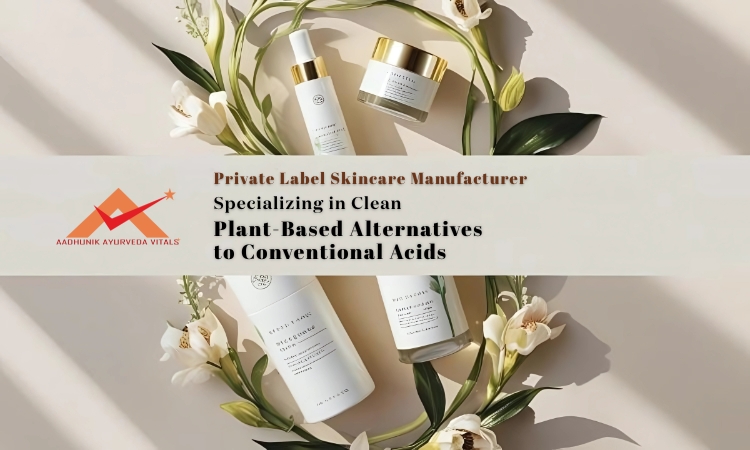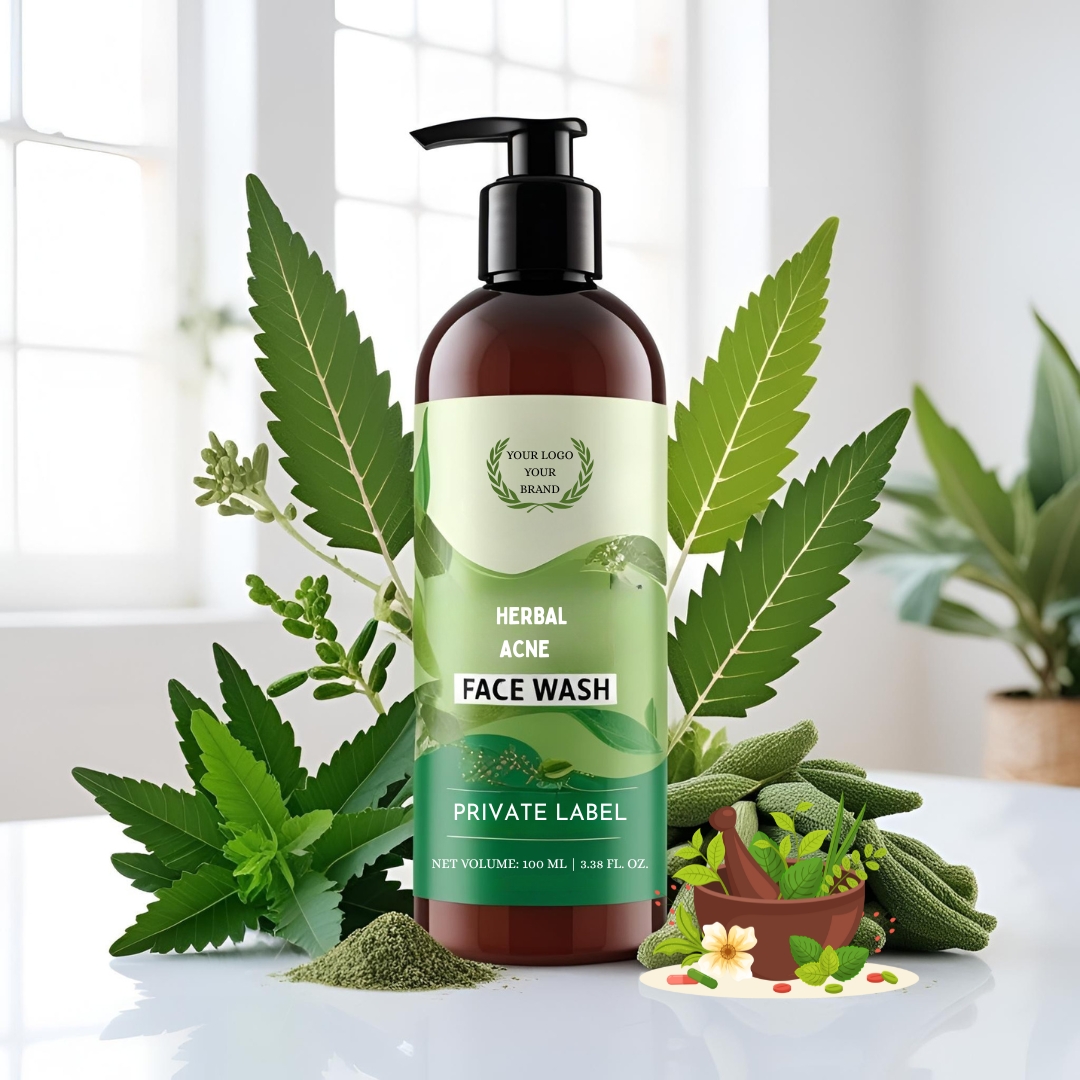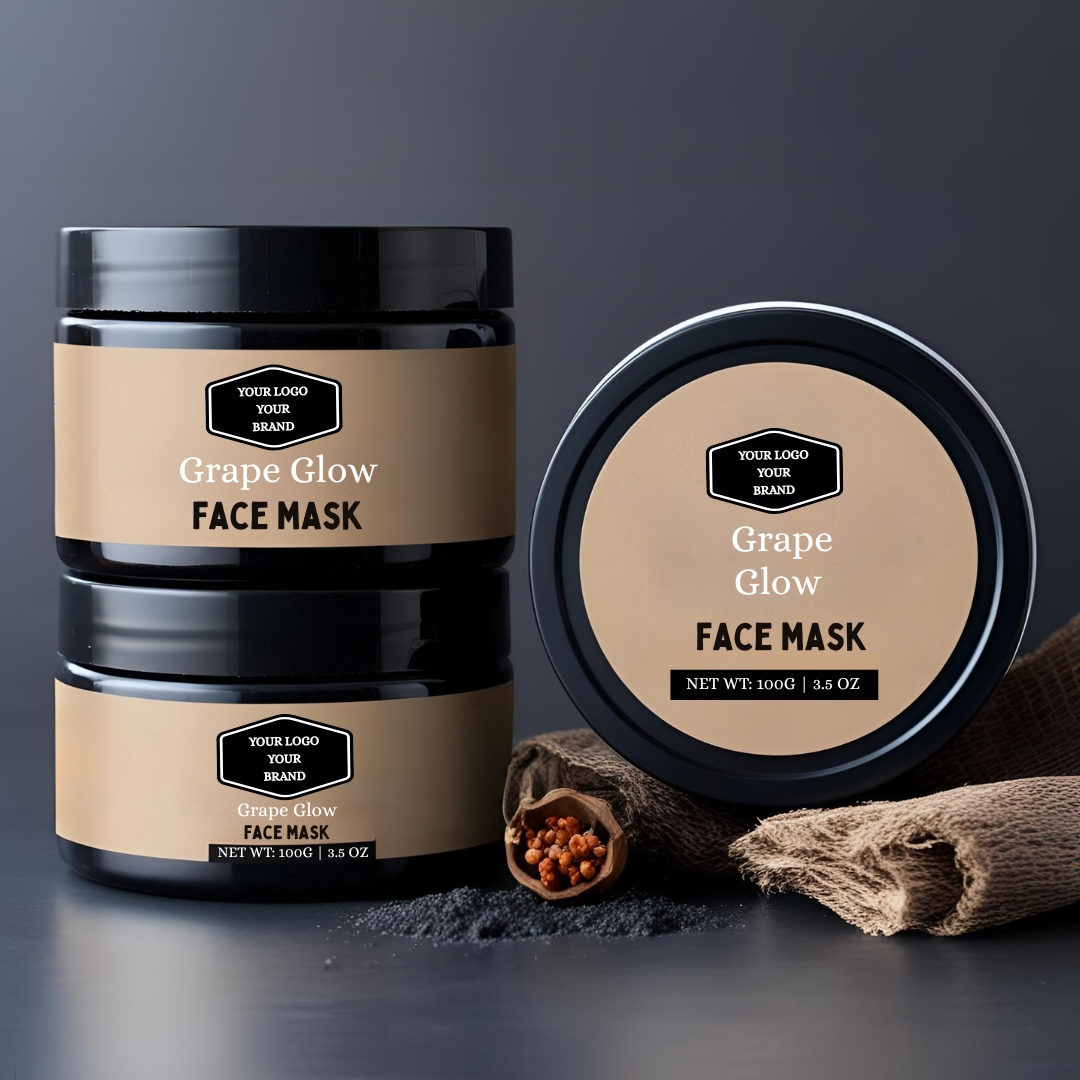
Private Label Skincare Manufacturer Specializing in Clean, Plant-Based Alternatives to Conventional Acids
Private Label Skincare Manufacturer Specializing in Clean, Plant-Based Alternatives to Conventional Acids | Aadhunik Ayurveda Manufacturing Advantage | The Manufacturer’s Role: Safe, Natural Formulation with Potent Results | Our Role as a Clean Skincare Manufacturer: Safe, Natural Formulations with Potent Results | Decoding Conventional Acids & Their Eco-Friendly, Plant-Based Replacements | Why Brands Choose Aadhunik Ayurveda for Clean Skincare Manufacturing| Partner With Us to Build Your Plant-Based Skincare Line>The skincare world is shifting. For decades, synthetic acids like glycolic, salicylic, and kojic acid ruled the formulations of face serums, peels, and exfoliants. They were effective, yes—but not always gentle. Today’s consumer wants more: powerful yet safe, effective yet natural, and results without the side effects.
At Aadhunik Ayurveda, as a private label skincare manufacturer, we understand this shift and have fully embraced it. Our approach is clear—move away from harsh acids and embrace their gentler, plant-based counterparts. Why? Because skincare shouldn’t just treat symptoms. It should nourish skin, respect its natural rhythm, and support long-term wellness.
Why Replace Conventional Acids with Plant-Based Alternatives?
Conventional acids such as salicylic acid, glycolic acid, and kojic acid are often derived synthetically or through complex chemical processes. While they offer benefits like exfoliation, brightening, and acne treatment, they can also cause irritation, dryness, and sensitivity, especially for people with delicate or sensitive skin.
Moreover, some of these acids are not biodegradable and can contribute to environmental damage. That’s why modern skincare brands are shifting to natural alternatives that are just as effective but gentler and safer.
As a clean beauty manufacturer, Aadhunik Ayurveda helps skincare brands find smarter solutions. We decode the purpose of these acids and substitute them with plant-based ingredients that nourish the skin and support long-term skin health.
The Manufacturer’s Role: Safe, Natural Formulation with Potent Results
As a manufacturer, our role is pivotal in this transformation. We collaborate closely with brands to develop formulations that meet their specific needs while ensuring safety and efficacy. Our approach involves:
Ingredient Sourcing: We prioritize sourcing high-quality, plant-based ingredients that are known for their skin benefits.
Formulation Expertise: Our team of experts crafts formulations that harness the power of these natural ingredients
Quality Assurance: Rigorous testing ensures that our products meet the highest standards of safety and performance
Regulatory Compliance: We ensure that all products comply with relevant regulations, providing peace of mind for our clients.
Our Role as a Clean Skincare Manufacturer: Safe, Natural Formulations with Potent Results
As a manufacturer, we don’t just mix ingredients. We co-create brand stories that reflect trust, integrity, and nature’s intelligence. Here’s how we help you switch from chemical acids to plant-powered alternatives:
Custom Formulation Expertise: We design unique recipes using natural acids sourced from fruits, grains, and botanicals,benefits.
Sustainable Ingredient Sourcing: Only ethically harvested and clean-certified raw materials.
Safety First: We ensure MOCRA compliance and dermal safety with every batch.
Holistic Product Design: :Not just skin care, we also formulate hair care and wellness products using the same principles.
Decoding Conventional Acids & Their Eco-Friendly, Plant-Based Replacements
Let’s break down each of the most common skincare acids, understand what they do, and how we replace them with cleaner, more sustainable ingredients, without losing the benefits.
Each ingredient below includes:
1. Vitamin C

What it does: Brightens skin, evens tone, supports collagen production.
Problems: Synthetic Vitamin C (ascorbic acid) can be unstable and irritating..
Clean Alternative: Orange, Sweet lime, Amla extract – are rich in natural Vitamin C.
Product Example: Private Label Brightening Facial Serum with lime & Amla..
2. Ferulic Acid
What it does: Antioxidant that boosts the effects of Vitamin C and E.
Problems: Lab-derived ferulic acid may not be sustainable..
Clean Alternative: Rice bran extract, wheat bran extract – naturally contain ferulic acid.
Product Example: Private Label Natural Antioxidant Booster with rice bran infusion.
3. Kojic Acid
What it does: Reduces pigmentation and brightens skin.
Problems: Can cause redness and irritation with prolonged use.
Clean Alternative: Licorice root extract, bearberry extract (contains arbutin), mulberry extract.
Product Example: Private Label plant-based Skin Brightening Cream with licorice & mulberry.
4. Salicylic Acid

What it does: Exfoliates, unclogs pores, treats acne.
Problems: May over-dry the skin and cause peeling.
Clean Alternative: Willow bark extract – contains natural salicin, a gentle exfoliator.
Product Example: Private Label Herbal Acne Face Wash with willow bark and neem.
5. Glycolic Acid
What it does: What it does: Exfoliates dead skin cells and smooths texture.
Problems: Can cause stinging and sensitivity.
Clean Alternative: Papaya enzyme, pineapple extract, Sugarcane juice (natural AHAs).
Product Example: Private Label Fruit Enzyme Exfoliating Mask with papaya and pineapple.
6. Citric Acid
What it does: Balances pH, exfoliates.
Problems: Synthetic versions may irritate sensitive skin.
Clean Alternative: Lemon peel powder, orange peel extract – natural sources of citric acid.
Product Example: Private Label Citrus Glow Toner with lemon and orange extract.
7. Azelaic Acid
What it does: Reduces inflammation, brightens, treats rosacea.
Problems: Lab-synthesized versions may irritate or dry the skin.
Clean Alternative: Barley extract, rye extract, oat extract – natural sources of azelaic-like activity.
Product Example:Private Label Calming Barrier Repair Cream with barley and oat.
8. Mandelic Acid
What it does: Gently exfoliates, good for sensitive skin.
Problems: Often derived synthetically.
Clean Alternative: Almond extract, apple cider vinegar (mild AHA-like properties).
Product Example:Private Label Gentle Exfoliating Toner with almond extract.
9. Malic Acid
What it does: Smoothes skin, improves hydration.
Problems: Synthetic malic acid can disrupt pH balance..
Clean Alternative: Apple extract, tamarind extract.
Product Example: Private Label Fruit Radiance Cleanser with apple and tamarind.

10. Tartaric Acid
What it does: Exfoliates, supports even tone.
Problems: Synthetically derived tartaric acid may be harsh.
Clean Alternative: Grape extract, a natural source of tartaric acid.
Product Example: Private Label Grape Glow Face Mask.

11. Phytic Acid
What it does: Exfoliates and reduces blackheads.
Problems: Synthetic versions may disrupt skin barrier.
Clean Alternative: Rice extract – naturally high in phytic acid.
Product Example: Private Label Rice Revive Toner.
12. Ellagic Acid
What it does: Reduces dark spots, acts as antioxidant.
Problems: Synthetic variants may be irritating.
Clean Alternative: Pomegranate extract, berries.
Product Example: Private Label Berry Brightening Cream with pomegranate.
13. Alpha Lipoic Acid
What it does: Anti-aging, antioxidant, smooths fine lines.
Problems: May cause redness in sensitive skin.
Clean Alternative: Spinach, broccoli, and flaxseed extracts.
Product Example:Private Label Private Label plant-based Age-Defying Serum.
14. Hyaluronic Acid
What it does: Deep hydration, plumps the skin.
Problems: Animal-derived sources may raise ethical concerns.
Clean Alternative: Tremella mushroom extract, aloe vera, flaxseed mucilage.
Product Example:Private Label Deep Hydration Gel with tremella and aloe vera.
15. Polyhydroxy Acids (PHAs)
What it does: Exfoliate gently, retain moisture, good for sensitive skin.
Problems: Often synthetically processed.
Clean Alternative: Gluconolactone derived from natural fermentation.
Product Example:Private Label Gentle PHA Face Lotion with fermented botanicals.
Why Brands Choose Aadhunik Ayurveda for Clean Skincare Manufacturing
Sustainable Sourcing: All our botanical extracts are sustainably harvested and cold-processed.
Customized Formulations: We tailor products to suit your brand’s vision, vegan, zero-waste, sulfate-free, etc.
Certifications: Products can be certified organic, Private Label cruelty-free , and tested for stability.
Low MOQ: Perfect for startups as well as established brands testing new markets.
Global Standards: Compliant with international regulations, including MOCRA, EU, and FDA guidelines.
Partner With Us to Build Your Plant-Based Skincare Line
As a private label skincare manufacturer, we help brands harness the healing power of plants while ensuring effective product performance. From ideation to formulation, manufacturing to packaging, our team works closely with you to create unique, natural skincare that meets today’s demand for clean beauty.
If you’re looking to launch or upgrade your skincare range with botanical alternatives to conventional acids, Aadhunik Ayurveda is the ideal partner.
Reach out to us today to create plant-powered, skin-loving formulations that customers will love and trust.
FAQ’s:
Can plant-based alternatives replace conventional acids effectively?
Yes, we formulate with proven natural ingredients that mimic acid benefits like exfoliation, brightening, and hydration.
Do you offer custom formulation using acid alternatives?
Absolutely, we develop tailored formulas using plant-based replacements that align with your brand’s values.
Can you help with ingredient sourcing and certification?
Yes, we source certified organic, wildcrafted, and fair-trade ingredients.
Do you provide MOCRA-compliant manufacturing services?
Yes, all our production follows MOCRA and other applicable international regulatory standards.
Can I start with a small batch order?
Yes, we support small-batch production for startups and offer scalable options as you grow.
How do you test for efficacy in natural acid alternatives?
We conduct lab, stability, and user-based efficacy tests (in vitro & in vivo) to ensure visible results and safety.